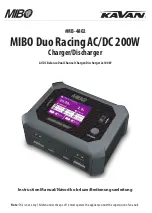
KC-P30 x-series
Functions
Configuration manual V4.14
33
© KEBA
●
Exporting or importing a list of stored RFID cards as
*.csv
file
Information
It is recommended to use a text editor for editing the *.csv file. Otherwise
the date can be interpreted incorrectly upon import.
The following entries can be made during teaching-in and editing of an RFID
card:
Eingabe
Beschreibung
Name of the Card
Name of the RFID card.
RFID Card –
Serial No. (UID)
Serial number (UID) of the RFID card.
Expiry Date
Date up to which the RFID card is to be valid.
Master RFID Card
Set the RFID card as master RFID card. Only one card can be
defined as master RFID card.
Status
Authorization of the RFID card. Here it is also possible to block
an RFID card and thus prevent charging with the relevant RFID
card.
Charging Station –
Serial No.
Serial number of the charging station where the RFID card may
be authorized. All or only certain charging stations in the charg-
ing network can be enabled for the RFID card.
5.2.4
RFID authorization with OCPP backend connection
If the charging station or a charging network is controlled by an OCPP back-
end, please note the following:
●
Teach in RFID cards:
All RFID cards must be "centrally taught in" at the OCPP backend.
●
"Authorization" in the web interface to "ON":
Each authorization request is relayed to the OCPP backend.
●
"Authorization" in the web interface to "OFF":
A charging process can only be started without holding up an RFID card
if the predefined token set in the configuration is recognized and ac-
cepted by the OCPP backend.
Information
For information on the functionality and the required settings of the OCPP
backend, refer to the specific manual of the system used.
5.2.5
Start charging process with RFID authorization
To start a charging process with RFID authorization, proceed as follows:
1) Plug the vehicle into the charging station.









































